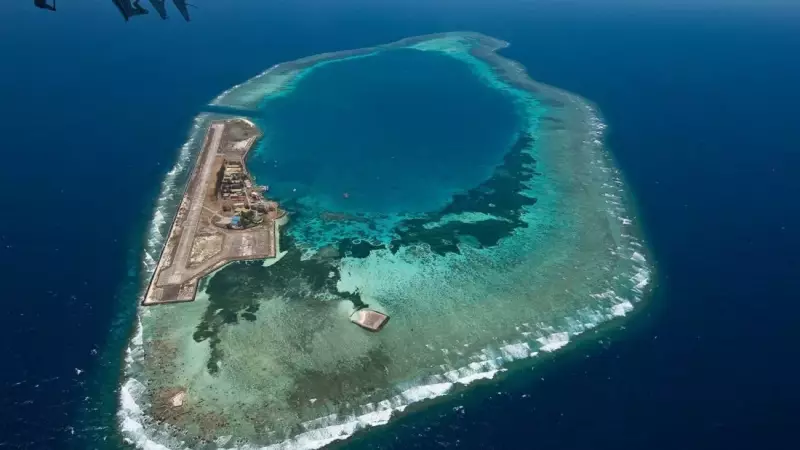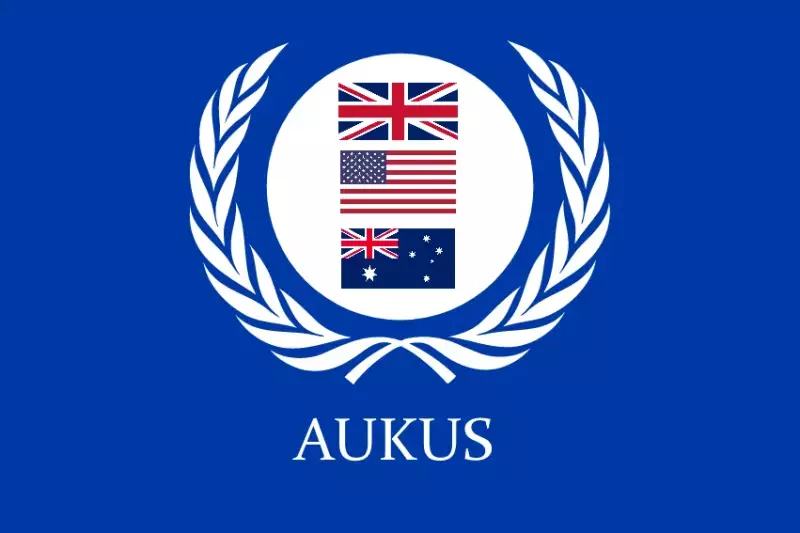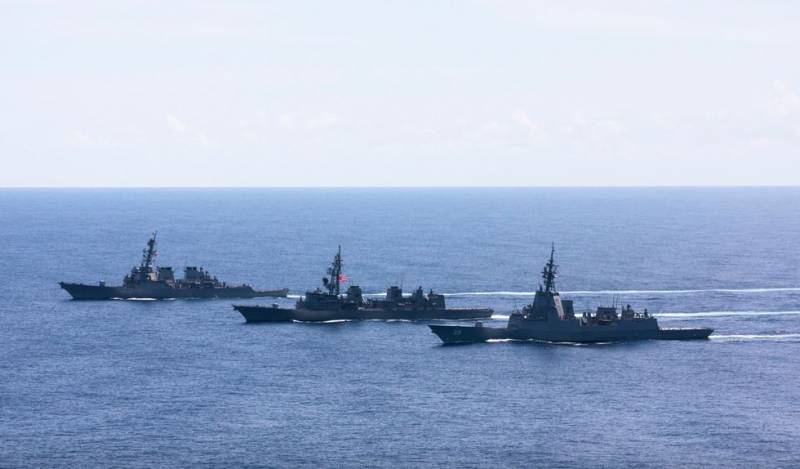If the third world war, then in the South China Sea

The Spratly Islands have become a stumbling block in the South China Sea
Chess with Americans
China is considered the rightful ruler in the South China Sea. This is an indisputable fact, but nevertheless haunts Washington. Control of the world's largest logistics flows must, by definition, belong to the Americans. This is what people around Joe Biden and a number of vassal states think.
Adding to the complexity is the configuration of the sea, sandwiched between China, the Philippines, Malaysia, Taiwan, Vietnam and Taiwan. Try, determine where your waters are, where your neighbors are, and where they are neutral. Especially when China's big neighbor has the second most powerful fleet in the world. Beijing's combined power in the region exceeds that of all other states.
The world gendarme in the person of the United States could not help but intervene in the affairs of six countries. There is only one goal - to rein in China, show it its place and create a coalition capable of resisting China in the region. Now this task looks much more priority than containing Russia in Ukraine.
Firstly, in the special operation there was a balance of power, albeit shaky, that suited the United States quite well. The threat of nuclear war, according to Washington, has passed in this theater of military operations.
Secondly, the conflict in Ukraine barely affects the sphere of strategic interests of the Americans. The Black Sea, which is currently turbulent, can hardly be considered an existential threat to the United States.
But the South China Sea is simply crammed with “growth points.” Taiwan is in the lead here. If not for its powerful technological potential, it would have long ago been brought to Xi Jinping on a silver platter. Naturally, having previously negotiated preferences for American companies in China. But Taiwan very timely developed the world's leading microelectronics industry and is churning out chips for the whole world.
Now you are reading this article from the screen of a device that did not include components from Taiwan. The Americans, to their shame, have never learned to produce world-class chips cheaply and just as quickly. And they are unlikely to learn in the near future. That’s why we are ready to fight for the island to the last. In words, at least.

To formalize confrontation with China, a reason is needed. They became the Spratly Islands (or Nansha in Chinese) and the Paracel Islands (Xisha).
The fact is that Beijing has recently demonstrated its rights to these small archipelagos. On the Paracels - since 1974, but surrounding players are trying to challenge it. With the support of the Americans, Taiwan and Vietnam are making claims.
The Spratlys also fully belong to the area of Chinese responsibility, but with minor nuances. The fact is that the islands were almost completely submerged during high tide. Rules were immediately adjusted to this fact, according to which China cannot lay claim to such small islands. There are not even islands here, the Americans and their “colleagues” said, but reefs barely sticking out of the water. Huge reserves of oil and gas - up to 20 billion tons - added piquancy.
China needed to act, otherwise the islands would inevitably be transferred to the Philippines, and therefore under American control. The response from Beijing was elegant. The Chinese brought in several dozen dredging vessels and simply expanded the surface area of the Spratly Islands. Now the tides are not scary either. Over time, the Chinese settled on the islands - buildings and even an airstrip appeared. Everything is exclusively for scientific purposes, as they declare in Beijing.
The Americans are furious - according to Taiwan, the Spratlys have air defense systems and anti-ship missiles. In The Hague, they even tried to concoct some kind of legal norm on this matter, prohibiting China from considering the waters around the constructed islands its own. This happened in 2016, but the Chinese did not care about the norm and continue to do so.
The main fire in the South China Sea is flaring up around the islands. The Americans are literally provoking, walking around the outskirts of the archipelago. In the spring of 2023, the Navy destroyer Milius passed through “defending the rights and freedoms of navigation in the South China Sea near the Spratly Islands.” It was also spotted near the Paracel Islands in March. American ships are defiantly entering Chinese territorial waters.
In Beijing, so far they are limiting themselves to notes of protest and concern.
A spark will start a fire
All attempts by China to assert itself as a power not just on a regional, but on a global scale inevitably collide with a pro-American coalition. There are enough unfriendly countries. Recently, loyal Vietnam suddenly forgets the war crimes of the Americans and launches the aircraft carrier USS Ronald Reagan into its port of Da Nang.
Washington is putting pressure on South Korea, which has an animal fear of the DPRK. A country that is one hundred percent dependent on the military will of the Americans is forced to join anti-Chinese sanctions. For example, to the “chip law”, which prohibits the supply of high-tech semiconductors to Russia and China.
Historical Tokyo suffers from amnesia along with the Vietnamese, having suddenly forgotten about the atomic bombings of Hiroshima and Nagasaki. However, this is far from news, but it still inspires shock. If South Korea plays primarily against China, then Japan is predicted to play the role of not only the Chinese antipode, but also the Russian one. It is on the archipelago that they plan to deploy medium and short-range missiles - this is a direct bid against Russia.
There is another reason why the Japanese dance to the American tune. Tokyo is still quietly hated by everyone around it. First of all, of course, the Chinese and Koreans, whom the Japanese slaughtered in the millions throughout World War II. Lonely samurai find nothing better than to surrender to the power of Washington.

Destroyers HMAS Hobart, Japan Maritime Self-Defense Force ship Kirisame and USS Milius during a joint regional presence in the South China Sea, October 2022. Source – popularmechanics.com
In 2021, the world heard about the acronym AUKUS, which hides a trilateral security pact between the US, UK and Australia. How China interfered with Australia remains to be seen, but the country has long been in Washington’s zone of influence. Therefore, Canberra is ready to put pressure on Beijing. To the best of my ability, of course.
In this whole story, Russia has an important influence, although not as much as we would like. The Kremlin's rapprochement with China and North Korea by hawks in Washington could be seen as a dangerous shift in the balance. One can only guess what retaliatory steps the Pentagon's hotheads will take.
Let’s not forget about India, a country capable of making a gigantic technological leap in the coming decades. The first signs are already there – the Indian lunar module has completed its mission and, for the first time in the country’s history, finds itself on the Earth’s natural satellite.
The Americans are well aware of the importance of India for stability in the South China Sea region and are trying in every possible way to win Delhi over to their side. Moreover, the Indians have long-standing territorial disputes with the Chinese. So far things aren't going well for Washington. Russia helps a lot by generously supplying India with cheap hydrocarbons. How America can help is not entirely clear, but work is underway.
Increasing tensions around the South China Sea in particular and Southeast Asia in general threaten the world much more than the conflict in Ukraine. In the end, two players are fighting for Ukraine – Russia and the United States. This greatly reduces the likelihood of fatal black swans. Multinational forces are now rallying around China, which are much easier to provoke into rash steps. The provocative behavior of the United States only adds fuel to the fire. The flame has been burning for a long time and at any moment it can turn into a global conflagration.
Information